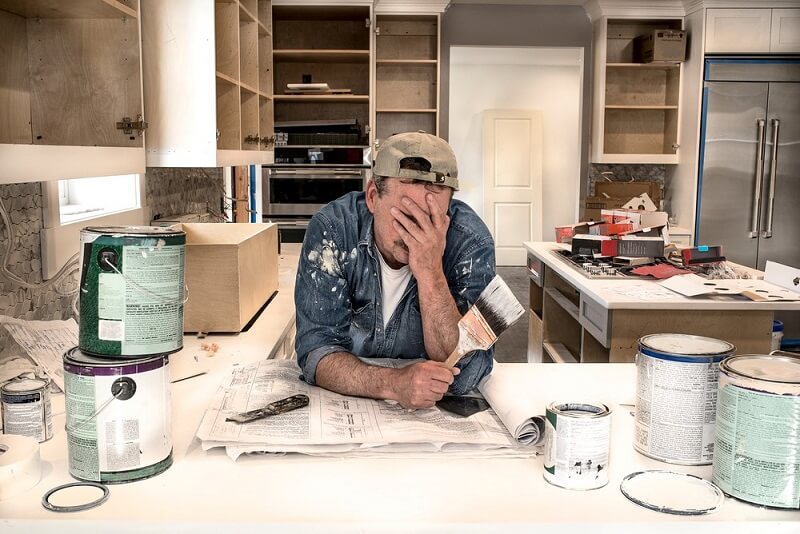
How to Prepare for a Successful Move to Denver: a Step-by-Step Guide
Moving to a new city can be both exciting and overwhelming. Denver, known for its vibrant culture, stunning natural beauty, and thriving job market, is

The house should be in its best condition when listing it for sale so that you can draw in more offers, get the best prices, and sell quickly.
It also enhances the home value for appraisal purposes, which goes a long way in convincing lenders to finance your buyer. You should fix everything that can be fixed before selling the house.
Fixing the house also makes you a contender for a home improvement tax deduction claim when you close the sale.
The amount spent on home improvement can be deducted from the selling price to lower the tax basis for your capital gains taxes.
You should hold on to those invoices and receipts and keep accurate project records. Depending on the nature and scope of the work, they can significantly affect your property tax.
What happens when you can’t afford to fix the house to sell it?
Let’s discuss avenues of accessing home improvement funds when you can’t afford to fix the house to sell it. Your specific circumstances will determine the best course of action. The house itself can even be used to unlock financing for the repairs.
You can approach a financial institution to front money for the repairs and renovations. They will need proof of income which they will use to determine if you qualify for the amount that you are asking for. They consider other liabilities you pay monthly and your credit rating, so it is not a guarantee that your application will be approved.
Different money solutions are available from banks to fix the house that you can work with:
“To ensure a successful renovation and to maximize returns with a HELOC, research the potential after-renovation value of your property,” said Salvatore Galifi, founder of SLG Home Buyer. He continued, “Look into what renovated properties are similar to your property sell for on the market. A HELOC might not be the right option if the potential gain in property value is less than the cost of renovations and repairs.”
This arrangement allows you to refinance your mortgage for a higher amount than what you currently owe if you have enough equity in the house to afford it. You take out the difference in cash, which you can use for the renovations.
If the market is favorable, you may pay a lower interest rate than you were initially paying. It also allows switching between an adjustable and a fixed interest mortgage. A combination of low interest rates and an increase in home value enables you to build up equity on the house faster.
These are also referred to as home repair grants. The government provides funds to homeowners at the federal, state or municipality level to make select upgrades to their houses.
Unlike loans, grants are not paid back as long as you meet their requirements. They make offsetting renovation expenses much easier and affordable even when credit restrictions and tight financial situations limit you.
It follows that grants are highly competitive yet limited in number. The authorities restrict their application to specific projects meant to improve efficiency, public safety, health and accessibility.
The specific requirements are unique for every grant, but they typically look at your income, whether you are in financial need and the type of project you are undertaking.
Before you sign up for an expensive loan, you might want to find out if your state or municipality has grants for homeowners to help pay for repairs and renovations.
Start with your local Housing and Urban Development (HUD) office. They offer grants and home repair loans for low-income homeowners. You can also make an online application to the Federal Government for a home improvement grant.
The National Residential Improvement Association (NRIA) is another great resource if you want a grant to fix your home. You just need to fill in an application form on their website, and they will provide a list of grants that fit your needs and which you can qualify for.
The United States Department of Agriculture (USDA) Housing Repair Loans and Grants are government-run programs whose goal is to facilitate the modernization of homes to enhance efficiency and the removal of safety hazards.
It is commonly referred to as the Section 504 Home Repair program. To qualify, you have to be a homeowner who resides in that house, and your family income should be below 50 percent of the median family income in your location.
They target the low-income bracket and homeowners who can’t afford credit elsewhere, so their requirements are less stringent than what your regular lender will need. Their interest rate is subsidized below the market rate, and they will allow an average credit score.
The maximum loan amount awarded under the Section 504 Home Repair program is $40,000, while the maximum grant is $10,000. If you qualify for both, the maximum amount you can get is $50,000. This figure can finance some major repairs.

Selling the home as is to a cash buyer is the best approach when you can’t afford to fix the house to sell it, you don’t have the time to make the renovations, you don’t have access to credit or grants, or fixing it doesn’t make any financial sense. The approach you will use to sell it is pegged on the house’s condition.
You are required by law to disclose any known issues to the buyer, so they will be aware of the shortcomings. However, you are not responsible for flaws that may be discovered during the home inspection or if you had no idea they existed.
The house’s value will be lower than comparable homes in the same housing market because of the state of disrepair.
Furthermore, you will not get the best price for the house as prospective buyers will be factoring in what they will need to spend on repairing and renovating the house and asking for matching, if not better discounts. The price will nosedive proportionally with the state of disrepair.
Whichever price you settle on, you should keep in mind that if the sale proceeds are insufficient to cover your mortgage payment (if there is any), listing and closing costs and pay realtor fees, you will be covering the difference out of your own pocket.
The state of the housing market surrounding your property address is also key to determining home prices. In a seller’s market, your prospective buyer will be anxious to lock the house down because many others are gunning for it.
They will be willing to undertake the renovations themselves without being too fussy, allowing you to sell it closer to the market value.
In a buyer’s market, the potential buyer has plenty of options to choose from, including houses that are well maintained. They will move on from your house in favor of move-ready houses.
The longer the house stays in the market, the harder it is to sell. The state of the house will also worsen while it is in your hands. You need to target buyers looking beyond the ugly houses to other benefits such as location and profit.
There are home buyers who are in it for the money. They will make a cash offer on your house in its current condition, eliminating the need to hire a real estate agent.
They will facilitate all the necessary repairs to flip the house or convert it to a rental property. The sale is much faster than when dealing with a regular buyer who has to seek lending approval.
Sell your house fast for cash as is, and you will get buyers in no time.

It only makes sense if the total cost incurred during the renovation is less than the value the project adds to the house, and you can retain your home equity.
The cost of the project also includes the cost of funds. If you are borrowing to finance the renovation, pay close attention to the fine print; look for hidden charges like recording, origination or appraisal fees and early payment fees.
Remember you will be paying off the home improvement loan with proceeds from the sale of the house, so these charges will apply to your case if they exist. Factor them into your calculations before signing the agreement.
Be wary of interest fluctuation. When the economy is unstable, the Federal Reserve will set high interest rates, which makes the loan expensive.
If it constantly increases more than your property value and you had committed all your equity to home repairs, you can find yourself in negative equity.
You will also find that some items that need repair, like cracked tiles, don’t add much to the house’s value but contribute to the repair cost.
If you sell the house as is, on the other hand, you won’t capitalize on the market price. You will be obliged to give discounts; the final selling price might not be sufficient to pay off your mortgage.
The cost of the project and your equity in the house should guide you towards the best course of action in your situation.

WeBuyHousesinDenver.org is a cash for houses company and we are experts at buying houses in Denver and all of Colorado. Our mission is to give the people of the Mile High city the best solution to sell any house. When you sell your house to us there are:
This is how selling a house in Denver should be!
Fill out the form to get your no-obligation cash offer today.
The latest real estate news, forecasts, insight, and advice are brought to you by the leading authorities in the Denver housing market. We have ears and boots on the ground in the Mile High reporting the facts. Extensive research goes into all our articles and we gather information from trusted real estate experts, renowned local Denver housing specialists, home buyers, and more. We buy houses Denver and as accomplished professionals with a proven track record, we now want to share our experiences with you. Please enjoy!


Moving to a new city can be both exciting and overwhelming. Denver, known for its vibrant culture, stunning natural beauty, and thriving job market, is
Value add in real estate means finding ways to make a property more valuable. This can include things like renovating, improving operations, or changing how
Colorado Springs is a great location for rental property owners, but even in high-demand rental markets, selling your rental property sometimes makes financial sense. The
We’re a service-focused, home buyer that specializes in helping homeowners get rid of burdensome houses quickly. We are Colorado cash buyers who can buy your house fast with a fair all-cash offer. Imagine an instant online quote to sell as-is, without realtors and on your timeline! As a house buyer that’s what we offer. Therefore, if you need to sell your house fast and need a trusted professional home buying company look no further because we buy houses fast for cash.
We Buy Houses In Denver, 1337 Delaware St, Denver, CO 80204